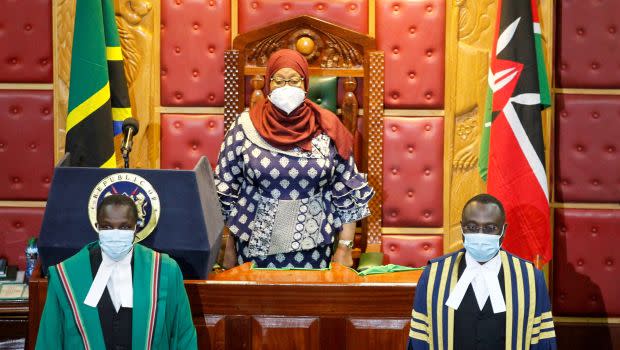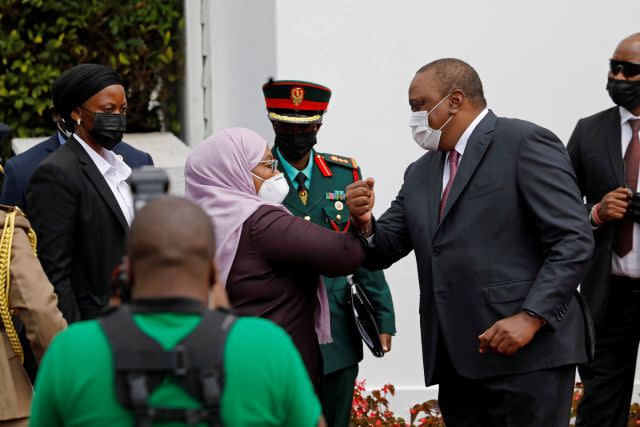Tanzania’s new leader is making up for lost time in the fight against Covid
- Oops!Something went wrong.Please try again later.

Just two months into her presidency, Samia Suluhu Hassan has announced some of Tanzania’s strictest Covid-19 measures since the pandemic first hit the country in March last year.
Early on, Hassan indicated a different approach to her predecessor, the late John Magufuli. She spoke about Covid-19 during her first presidential address, saying: “We cannot isolate ourselves as an island while the world is moving in a different direction.”
Tanzania implemented very few measures against the coronavirus pandemic last year. Magufuli famously downplayed the threat of Covid-19, despite activists and politicians signaling the alarm over a deadly second wave, which hit the country at the beginning of this year.
Under Magufuli’s directive, herbal remedies were promoted, the number of Covid cases ceased to be counted, and people were urged to pray to defeat the virus. This was a pivot from the country’s initial response, where schools were shut and borders were closed for almost three months.
Hassan arrived in office on March 19, two days after the death of Magufuli, which was attributed to heart complications. One of the pressing questions surrounding her presidency was how she would approach the pandemic. Her recent directives are a measure of how different her approach is to Magufuli’s, including the fact that she wore a mask on recent visits to Uganda and Kenya.

Hassan is greeted by Kenya’s president Uhuru Kenyatta in Nairobi on May 4.
But a recent travel advisory, released by the Ministry of Health this week, signifies increased caution over new virus strains. All travelers arriving from countries with new Covid-19 variants, based on the WHO daily updates, or those who have traveled through those countries in the last 14 days, will now have to quarantine for two weeks.
Flights to and from India have been banned until further notice. The Covid-19 variant from India has already been detected in Tanzania’s neighboring countries, Kenya and Uganda.
Krisp, a South Africa-based research institute, recently reported that the most mutated Covid-19 variant yet was found in travelers from Tanzania.
The announcement has placed stricter measures at the country’s borders. For the first time, those entering Tanzania must provide a negative Covid-19 PCR (lab) test. Those coming from countries with a high number of cases must also take a rapid test on arrival.
Hassan’s border restrictions come one month declared she had formed a committee of experts to advise her on how to manage the pandemic. However she has yet to comment on whether she will stick with Magufuli’s decision not to procure Covid-19 vaccines for Tanzanians.
There has also been a minor shift in media reporting about the pandemic, with journalists able to speak more freely. Under Magufuli, several media organizations were fined, and their licenses suspended over coverage of the virus. At the beginning of April, Hassan instructed the Ministry of Information to lift a ban on online television outlets.
“Previously, there was an environment of fear and censorship,” says Khalifa Said, an investigative journalist based in Dar es Salaam. “That has changed with Hassan. She has said she does not want her administration to be accused of muzzling the media. This has helped to open up some spaces for debate and discussion that were not there before.”
Hassan has also recognized the impact of the pandemic on the economy, stating that the country’s “growth has dropped from 6.95% to 4.7% as a result of Covid-19.” The IMF predicts the country’s GDP will only grow 2.7% this year.
A doctor at Tanzania’s national hospital, who wishes to remain anonymous, said these new measures are a “good beginning.”
“Compared to the way we were handling it before, this is a step in the right direction. Currently, we are seeing fewer cases in the hospitals, but there is a definite risk that we could feel the effects of the crisis in India.”
Sign up for the Quartz Daily Brief, our free daily newsletter with the world’s most important and interesting news.
More stories from Quartz:
Why is India, the world’s largest vaccine producer, running short of vaccines?
The Indian government has ordered its vaccine doses in fits and starts

